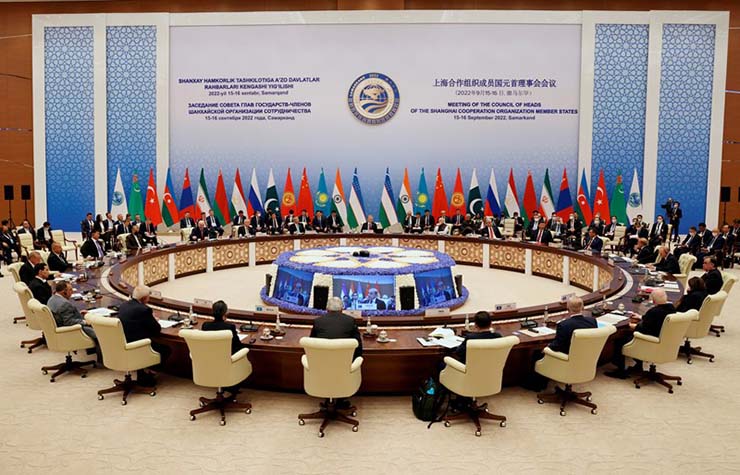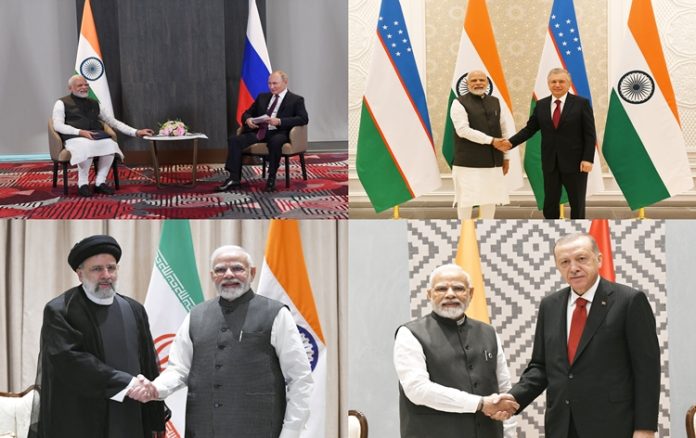
It was in the backdrop of Russia’s invasion of Ukraine and China’s threat to Taiwan, the Shanghai Cooperation Organisation held its 22nd summit in Samarkand in Uzbekistan. It was also held for the first time in-person since 2019. On account of Covid-19 triggered pandemic, the SCO summit in 2020 and 2021 had been organised in a virtual format.
Therefore, the SCO summit in Samarkand was a keenly watched affairs in the international media–more so in the background of the fact that three international political heavyweights Prime Minister Narendra Modi, Russian President Vladimir Putin and Chinese President Xi Jinping were attending the meet along with heads of state of Pakistan and Central Asian countries. Iranian President Ebrahim Raisi and Turkish President Recep Tayyip Erdogan also participated in the meet.
Prime Minister Narendra Modi attended the SCO summit in the backdrop of the deadly Galwan Valley incident of June 2020. As such, the meet had added flavour to the taste of strategic watchers across the world. They expected that with Russian President Vladimir Putin and Chinese President Xi Jinping in attendance, Prime Minister Modi’s participation at the summit would bring a breakthrough in India and China’s frosty relations.
While it did not happen, the media focus was directed towards China-Russia and India-Russia bilateral meets where Russian President Putin found himself under huge pressure from friends and allies due the Ukraine war. Perhaps, he had anticipated it and it reflected in his speech given during his bilateral meetings with different countries’ leaders on the sidelines of the SCO meet in Samarkand.
But then he had never expected that his close friend and the Indian Prime Minister would push him to the wall on the Ukraine war and that too in the glare of the international media. Prime Minister Modi emphatically told the Russian President about the futility of war in the current age and linked it with deepening food, fuel, and fertilizers crisis in the developing countries in Asia, Africa, and Latin America.
Prior to this, no other leader had dared to tell the Russian President on his face that he was the factor of the humanitarian crisis in the world as forcefully and convincingly as Prime Minister Modi. This is what made him purse his lips several times while squirming in his seat throughout the meeting with the Indian Prime Minister. The Russian President acknowledged Prime Minister Modi’s concern on the war. But he blamed Ukraine for not being keen to end the war. He said Ukraine had rejected negotiations for peace. However, he assured Prime Minister Modi during the bilateral talks that “We will do everything to stop this as soon as possible.”

Earlier, during his bilateral meeting with Chinese President Xi Jinping, the Russian President acknowledged that he understood his Chinese friend’s concern on the war. In fact, while being under tremendous pressure from his friends and allies, President Vladimir Putin found no option to be evasive on the war which has entered 7th month and has resulted in huge death tolls and destruction in Ukraine, known as the bread basket of the world. On account of Russian hostilities, wheat supplies from Ukraine have come to a halt, threatening hunger and political instability in the developing countries.
Russia and Ukraine export nearly a third of the world’s wheat and barley. They are major suppliers of corn, while they account for more than 70 percent of sunflower oil exports. Russia has claimed that almost all the Ukrainian grain shipped under an UN-backed deal to ease a global food crisis, is reaching rich European nations and not the poor nations. Ukraine has denied Russian accusations. Instead, data compiled by a joint centre in Istanbul in Turkey, showed that slightly more than a third of the grain delivered to European countries and another 20 percent to Turkey, Spain, and Egypt. However, data showed that 30 percent of grains from Ukraine are reaching low and lower-middle income countries.
Whatever may be the truth, Russia is now struggling on the war front. Months long war seems to have taken a toll on Russian troops’ fighting capabilities. As per media reports, Ukrainian forces have forced Russian troops to retreat from the Kharkiv region in the east and Kherson in the south.
Overall, for Putin, the SCO summit proved to be a summer of woes as even Turkish President Tayyip Erdogan, who attended the summit as the group’s dialogue partner urged the Russian President during the bilateral meeting, to seek a path of peace rather than war.
For Chinese President Xi Jinping, the SCO summit was the first multilateral forum for him to attend in-person since 2019. It offered him an opportunity to show his weight to the international community. Held a few weeks ago the Communist Party of China’s 20th National Congress, expected to take place on October 16, the SCO summit, in fact, offered President Xi an opportunity to present the bloc as an alternative to the West-led international mechanism. This view point was underlined by him during his opening speech at the SCO summit where he said the SCO as an “important constructive force” in international and regional affairs, should keep itself well positioned in the “face of changing international dynamics.”
In the midst of border tension with India, the Chinese President called for strengthening of mutual understanding and political trust and supporting each other’s efforts to uphold security and development interests. Still the broader aspect of Xi’s speech was splattered around the US and its approach towards China. The US, Europe and the UN’s attack on China on account of its treatment of minority Uyghur Muslims in the Xinjiang region was described by the Chinese President as an interference in the internal matters of a sovereign country. He called on the SCO members to jointly oppose interference in other countries’ internal affairs under any pretext.
The SCO summit was also used by China to convey to the US and Europe that their sanctions regime has no sanctity and that the group members should reject it. He called upon member countries to remain firm in safeguarding the UN-centred international system and international order based on international law. Overall, President Xi tried to use the group as an extension to carry out the ongoing China vs US fight. Moreover, with Russian President Putin by his side, the Chinese President at the SCO summit was more like a WWE wrestler who was flexing muscle against more determined and smarter rival America in the ring.
In the changed global situation, however, Russia and China have tried to foist the SCO as an alternative to NATO and Quad. But because of the presence of different countries in the SCO with heterogeneous interests, will China and Russia ever be successful in giving life to their plan in the Indo-Pacific region is in the realm of speculation.
–The writer is a senior journalist with wide experience in covering international affairs. The views expressed are of the writer and do not necessarily reflect the views of Raksha Anirveda








